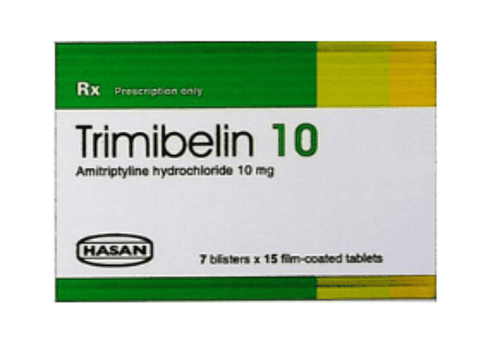This is an automatically translated article.
The article was professionally consulted by Specialist Doctor I Vo Thi Thuy Trang - Digestive Endoscopy Doctor - Department of Medical Examination & Internal Medicine - Vinmec Da Nang International HospitalStress also known as stress can affect all parts of the digestive system. And the stomach is an important part of the digestive system. Stress is believed to be one of the causes of stomach ulcers.
1. What happens to your stomach when you are stressed?
The human digestive system is controlled by the enteric nervous system (vagus nerve, also known as nerve number X), which is a system of hundreds of millions of nerves connected to the digestive system. central nervous system.
When you are stressed, it activates a "fight" response in your central nervous system, digestion can stop because the central nervous system cuts off blood flow here, affecting to the contractions of your digestive muscles, and reduce the secretion of fluids needed for digestion. Stress can cause inflammation in the digestive system, and make you more susceptible to infections, especially H.
Stress can cause spasms in the esophagus, increasing acid in the stomach causing indigestion. When stressed, digestion in the stomach can be disrupted and make you feel nauseous.
Not all cases of stress cause conditions like stomach ulcers, gastritis, colitis, but one thing is for sure, stress can make your digestive system suffer. The problem is worse and if this condition continues, it will cause gastritis.

2. How does stomach pain caused by stress manifest?
Stress-induced abdominal pain can be related to your emotional state or mental health, your digestive health or gut condition, or a combination of the two.
Stress colic can also be your digestive system's natural way of working during times of stress.
Common symptoms of stomach upset due to stress may include:
Uncomfortable feeling in the stomach Spasms, agitation, cramps, tightness in the stomach Feeling nervous Tremor tremors, tremors, muscle twitching Frequent bloating Abdominal pain, nausea or vomiting Indigestion or rapid satiety with food Increased urination and defecation In rare cases, stomach upset due to tension can can have a strong effect on the intestines. Frequent or uncontrolled urination or bowel movements, sometimes vomiting or nausea can be the result of stomach irritation from overstressing, but not always.
3. How to treat stomach pain caused by stress?
Stomach pain caused by stress can often be treated with natural home remedies, as well as lifestyle changes.
3.1. Try Herbal Remedies Some herbs can calm an upset stomach in some people when it's happening. If you feel nauseous or vomiting, ginger can help. Chew a piece of ginger, drink ginger tea, eat ginger candy.
Other herbs, like mint, lavender, or perilla are well known antispasmodics. They can stop the contraction and tightening of smooth muscles that cause bloating, gas, cramps, and discomfort. You can eat one or two fresh leaves or enjoy these herbs in tea.

3.2. Avoid products with caffeine, especially coffee The caffeine content in coffee can cause stress and anxiety, making your illness worse. What's more, coffee irritates the gut, worsening bowel symptoms.
You should not drink coffee until your digestive tract is stable again. Or you can use less stimulant caffeinated beverages like green tea or oolong tea.
3.3. Practice deep breathing, positive thinking, and meditation Mental exercises help you focus on your breath and bring you back to the present moment. This can control stress and anxiety that cause a stress stomach. Deep breathing can be especially helpful with your condition.
If you enjoy meditation or have any other mental tricks to calm you down, try them out.
3.4. Try a diffuser or soothing aromatherapy Essential oil sprays, or essential oils used as aroma diffusers, have been known to help reduce anxiety in some people.
Buy products with soothing herbs such as chamomile, lavender, vetiver or rose and follow the product instructions. Combine this with some relaxing time and space for yourself in the face of stress.
3.5. Find space for yourself to relax Finally, find time and space for yourself to clear your mind and manage your anxiety, even if it has to be alone time. Don't be afraid to make excuses for yourself, even if it stems from an important event.
If possible talk to a friend, family member or loved one to help, do so during this time. Talking to someone you trust can help you overcome stress and anxiety.

4. Why do I get stomach pain due to stress?
The brain and digestive system are connected via the vagus nerve, which is one of the largest nerves in the body. This nerve sends signals from the brain to the gut and vice versa, when stress and anxiety occur, it increases digestive irritation and abnormalities.
If you have frequent symptoms of abdominal pain and especially if your symptoms are getting worse, you may need to pay more attention to your stress levels and digestive health .
In rare cases, stomach pain caused by stress can signal an underlying health problem. If restlessness is a common occurrence for you, see your doctor to get it checked out.
Your doctor will help rule out other problems that may affect your stomach, such as:
Irritable bowel syndrome Peptic ulcer disease Inflammatory bowel disease Celiac disease Anxiety disorder In these cases More rarely, tension stomach pain may be related to gallstones or damage to the vagus nerve.
Otherwise, tension stomach pain is a completely normal phenomenon that can be easily managed.
5. How can an upset stomach caused by stress be prevented?
Several treatments are a quick fix for stomach upset. However, if it's a common and troubling condition, here are some more holistic lifestyle approaches that may help.5.1. Managing the stress in your life Stress-induced stomach pain can mean you're in a state of anxiety. Are you going through a lot of stress lately? Are you about to have a big event, a job interview or an experience that stresses you out?
On the other hand, if you are facing chronic stressful experiences and many stomach upset symptoms on a daily basis, it is essential to find the time and ways to manage that stress. Your stomach upset symptoms may then ease.
5.2. Improve gut health Stress-induced upset stomach can be a sign that you have a digestive problem. It also means that both stress levels and digestive health need to be improved. Coping with many symptoms like indigestion, bloating, gas and stress are obvious signs of this.
Try simple changes in your diet like eating more fiber and probiotic-rich foods. Preliminary research in rats has shown that probiotics may help alleviate anxiety with intestinal symptoms, through effects on the vagus nerve.
Talk to your doctor before making major changes to your diet and taking supplements, especially if you take medication.

5.3. Change your meals Your digestion may be hindered, which can cause your stomach to strain. Try eating small meals instead of large ones. Smaller, lighter meals with easy-to-digest foods when dealing with stomach upset. You can also try eating snacks and snacks more often, instead of three main meals a day.
In particular, use green, bitter vegetables such as kale, spinach and lettuce in salads.
5.4. Get more exercise Finding an outlet for stress and anxiety can reduce its negative impact on the digestive system. Exercise and other physical activity, such as yoga, can be helpful for you.
If you feel abnormal symptoms persist, contact your doctor immediately for advice and support.
Please dial HOTLINE for more information or register for an appointment HERE. Download MyVinmec app to make appointments faster and to manage your bookings easily.
Reference source: healthline.com













